Nutrition Science & Dietetics News
October 28 event features alumni in disability advocacy
Falk College Career Services will host the “Falk College Alumni Speaker Series: Improving Access for People with Disabilities” on October 28, 2021, from 3:30 to 4:45 p.m. in Grant Auditorium, followed by a networking reception with refreshments from 5 to 6:30 p.m. The panel discussion will focus on current issues surrounding accessibility in a range of environments, and will be of particular interest to students seeking internships or careers in healthcare, mental health, education, policy and advocacy, and sport and recreation.
This is the fourth event in a series of Falk College alumni panels, which bring alumni back to campus to discuss current industry trends of interest to Falk students and share valuable career experiences and insights. Previous alumni panels have focused on topics such as community health and wellness; promoting exercise and nutrition as natural approaches to health, and; sport, health and social activism.
“For students, this is an exceptional opportunity to learn more about how they can be an advocate in whatever field they pursue,” says David Sly, director of Falk College Career Services. “In addition to learning about the specific careers of our panelists, students, faculty, and staff can leave this event with ideas for better serving people with a range of disabilities in any setting.”
The “Improving Access for People with Disabilities” panel will include four Falk College alumni:

Scott Ebner, MSW ’97
Scott Ebner is the Executive Director at CIRCARE, a local agency that supports people with behavioral health disabilities, including family and employment support. He has also worked with Provisions Bakery in Armory Square, a work transition site for people with mental illness.
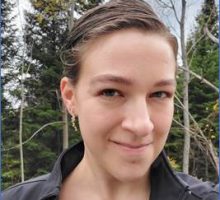 Jeremy French-Lawyer, BS Public Health ’14
Jeremy French-Lawyer, BS Public Health ’14Jeremy French-Lawyer is the Assistant Director of Evaluation, Assessment and Research at SUNY Upstate Medical University. Jeremy also has previous experience as a Disability Integration Fellow with SUNY Upstate, integrating disability-relevant information into medical school and continuing medical education curriculum. Other previous roles include working with children and at-risk parents in education and healthcare settings. Jeremy holds a master of public health (MPH) degree jointly awarded from Syracuse University and SUNY Upstate Medical University.
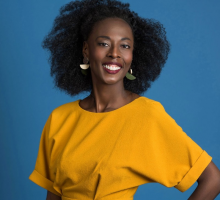 Ocesa Keaton, MSW ’15
Ocesa Keaton, MSW ’15Ocesa Keaton is the Central New York Regional Director for New York Civil Liberties Union and has previously served as the ADA Coordinator for the City of Syracuse. Ocesa has extensive experience in youth and advocacy programs, with a focus on at-risk pregnant and parenting teens, youth violence prevention, and poverty.
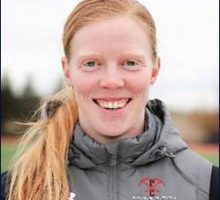 Eileen May-West, BS Sport Management ’10
Eileen May-West, BS Sport Management ’10Eileen May-West is the Program Director at Wasatch Adaptive Sports and leads outdoor adaptive recreation operations for over 500 individuals with disabilities each year. Eileen holds a master’s degree in therapeutic recreation from the University of New Hampshire.
For Syracuse University students, registration is appreciated, though not required, through Handshake. For faculty, staff and community attendees, please RSVP to falkcareers@syr.edu. CART and ASL services will be provided. To request other accommodations, please contact Falk Career Services at falkcareers@syr.edu or 315.443.3144. For event information, visit the event page.
Recipe for Research
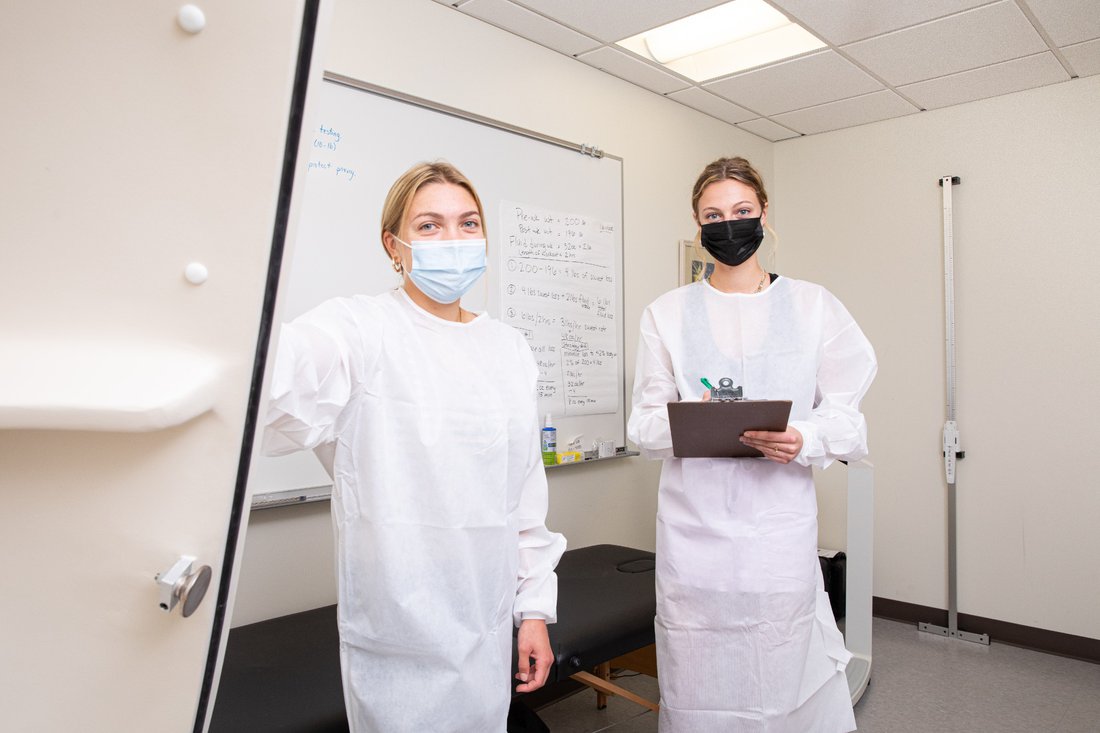
Samantha Jezak ’22 and Olivia Templeton ’22 are really passionate about food. From Jezak’s business fromsamsplate to Templeton’s Instagram feed, their love for good, healthy food is apparent. So, it’s no surprise that these two foodies who study nutrition at Syracuse University’s Falk College teamed up for a study on the benefits of a three-month vegetarian diet among adults.
Jezak and Templeton began with a small group of participants last semester and are enrolling more this fall. Working under Assistant Professor Jessica Garay, they are measuring changes in diet quality and inflammatory markers to identify when the benefits of switching to a vegetarian diet become apparent. The results will provide insight into whether a lacto-ovo vegetarian diet—consumption of some animal-derived products, such as eggs and dairy—is combative against inflammatory diseases, such as diabetes, heart disease and cancer.
Both Jezak, a nutrition science major, and Templeton, a nutrition major, were eager to conduct research. It was one of the reasons they both chose to attend Syracuse University. Aware of their interest in leading their own research, Garay gave them guidance regarding the existing research on the benefits of a vegetarian diet. The two seniors noted that many studies failed to address a timeline of how long a person had been following the diet. Jezak, who is interested in inflammation in the body, felt it was important to address the length of the diet when recruiting people for a vegetarian study. “That’s why we took this approach of analyzing when we see the effects of a vegetarian diet and how that affects inflammation,” Jezak says. The two are hoping this study provides more information on if and when changes occur in the body while on a vegetarian diet. Specifically, they are investigating how biomarkers, diet quality, body composition and stress are affected by making this dietary change.
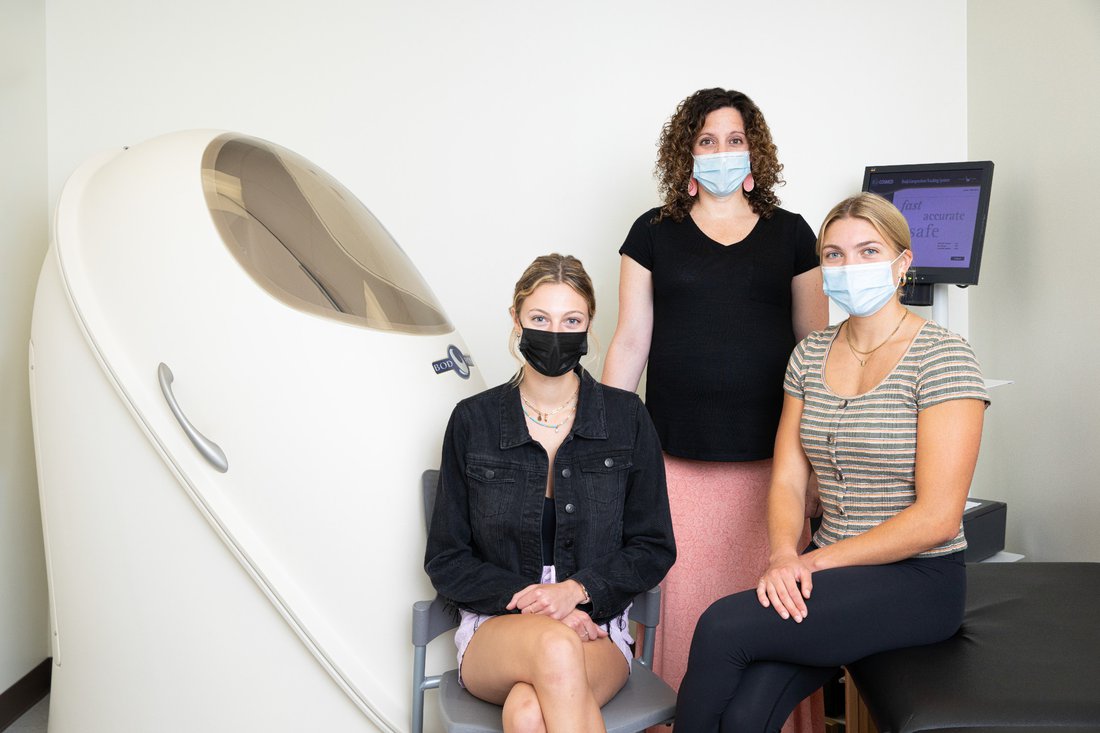
Diving into the Study
The duo started the pilot study last spring with four participants. They began with an informational lecture on how to follow a vegetarian diet correctly. After that, the study participants came into the lab three times every six weeks. In addition to a questionnaire that addressed how participants were feeling, Jezak and Templeton conducted more scientific tests using a finger prick and saliva samples. For these, they were looking at biomarkers, omega-3 levels, cholesterol, blood lipids and C-reactive protein. “We’re getting a bunch of inflammatory markers to see how they’re changing, which ones are changing and when,” Jezak says.
This fall, they utilized Facebook groups to open the study to the greater Syracuse community and are continuing the study throughout the semester, using the winter and spring to analyze the findings and write about them for their Honors theses.
Jezak and Templeton, who are also both scholars in the Renée Crown University Honors Program, focus on different things when analyzing results. Jezak, as a nutrition science major, is focusing more on the the biomarkers, while Templeton, as a nutrition major, is concentrating on how the participants are feeling throughout the process. “Because this was such an expansive project, we’re able to work on collecting the data together and analyzing separate parts of it,” Templeton says.
The research team is waiting to analyze the results of the pilot study. They’ve frozen the omega-3 and saliva samples and will send those to the lab along with the samples collected this fall. Once those results are in from the lab, they’ll review alongside diet records, which will be used to determine diet quality. “People said that they were feeling better, not craving meat as much, and feeling a lot more confident on the vegetarian diet and that they may continue it,” Templeton says of the early feedback from pilot study participants.
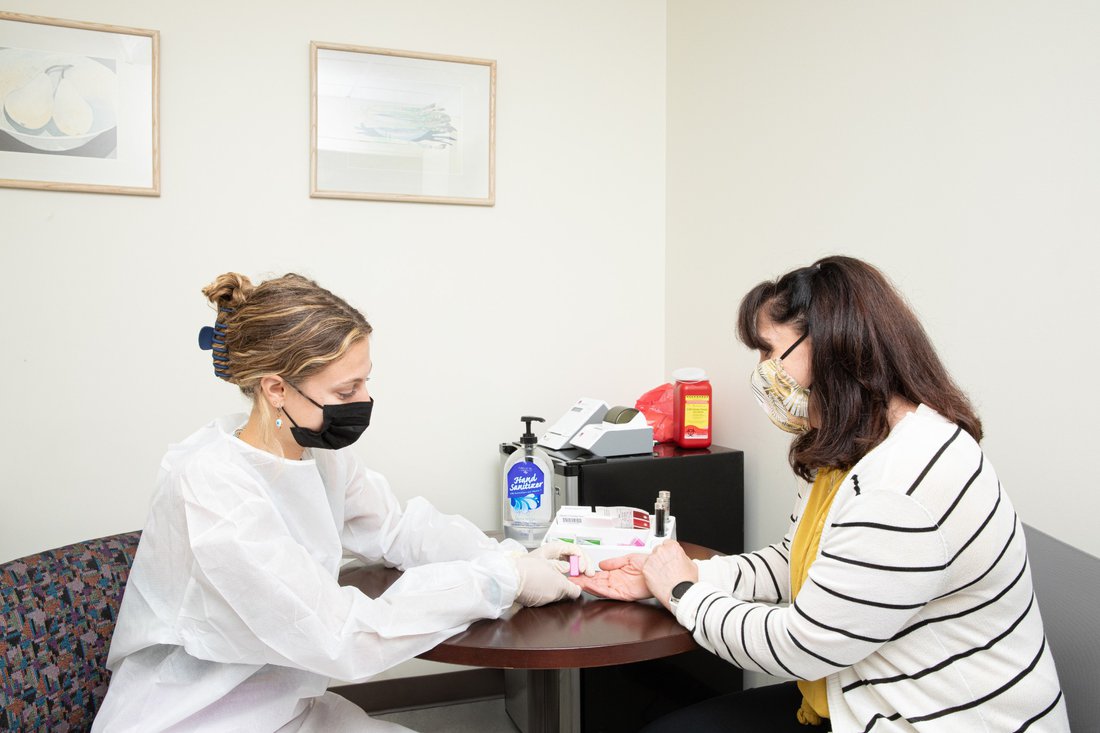
Funding the Research and a Mentoring Relationship
The study was funded by the Syracuse Office of Undergraduate Research and Creative Engagement (SOURCE), which supports undergraduate participation in faculty-guided scholarly research. They initially received $5,000 for the project and the duo recently received an additional $1,000 expansion grant. Jezak says the SOURCE staff was incredibly helpful with crafting the application, offering tips on what information to include or exclude. Students interested in getting a SOURCE grant for their research should talk to their professors and department. SOURCE student research mentors also hold weekly office hours to assist students.
“SOURCE really is a great example of what we have here at Syracuse,” Jezak says. “I’m thankful for their assistance and for being able to do this type of research as an undergraduate.”
Both Jezak and Templeton are grateful to Garay for guiding them through the research process. Under her tutelage they’ve learned how to operate the lab equipment necessary for the study, and she’s been a great resource for sharing ideas. “She’s really been instrumental in this research,” says Templeton. “She’s been there for anything that we might need help with.”
Jezak adds, “I came to Syracuse excited to do research, but I give so much credit to Professor Garay, because she is the one who pushed us to do our own study. Professor Garay is so excited and passionate about what she does, and it’s not just us that she has been there for. She has other students who work under her, and she is just as involved with their studies and getting the ball rolling on their research.” Templeton says Garay often will email students articles and research she thinks they’d be interested in learning more about.
Garay has enjoyed assisting Jezak and Templeton with their research. “It has been a pleasure to work with both Sam and Olivia because they are highly motivated and share a strong interest in the topic. I am looking forward to mentoring them through this process and as they complete their honors thesis,” Garay says.
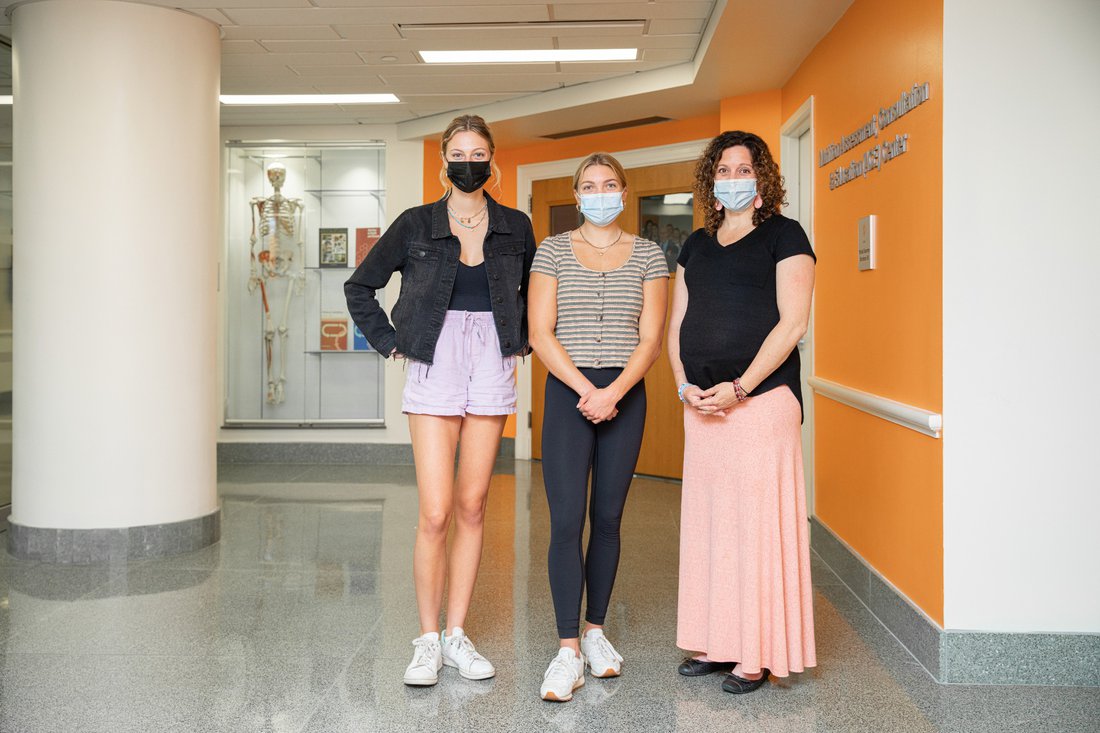
Looking Beyond Graduation
Both seniors are looking forward to what comes next. Jezak is applying to the Fulbright Program, where she hopes to continue her research in nutrition in Australia and is also applying to Ph.D. programs in the U.S. in molecular nutrition. Templeton is looking into a dietetic internship as she aspires to become a dietician nutritionist. She plans on earning a master’s degree as well, specializing in gut health.
Both are grateful for their research experience and are confident it will help with their future endeavors. “I feel lucky in the sense that I have had the opportunity to do my own research, since many students do not have this opportunity until graduate school. This has also given me the opportunity to leave a mark on the nutrition field before I even receive my undergraduate degree,” Templeton says.
Adds Jezak, “I simply feel more prepared and confident in my ability to conduct research. I am appreciative that I get to pursue my passion and use it to better the health and life quality of others.”
Adapted from an SU Story by Lisa Maresca originally published on October 12, 2021.
Nourishing a Dream
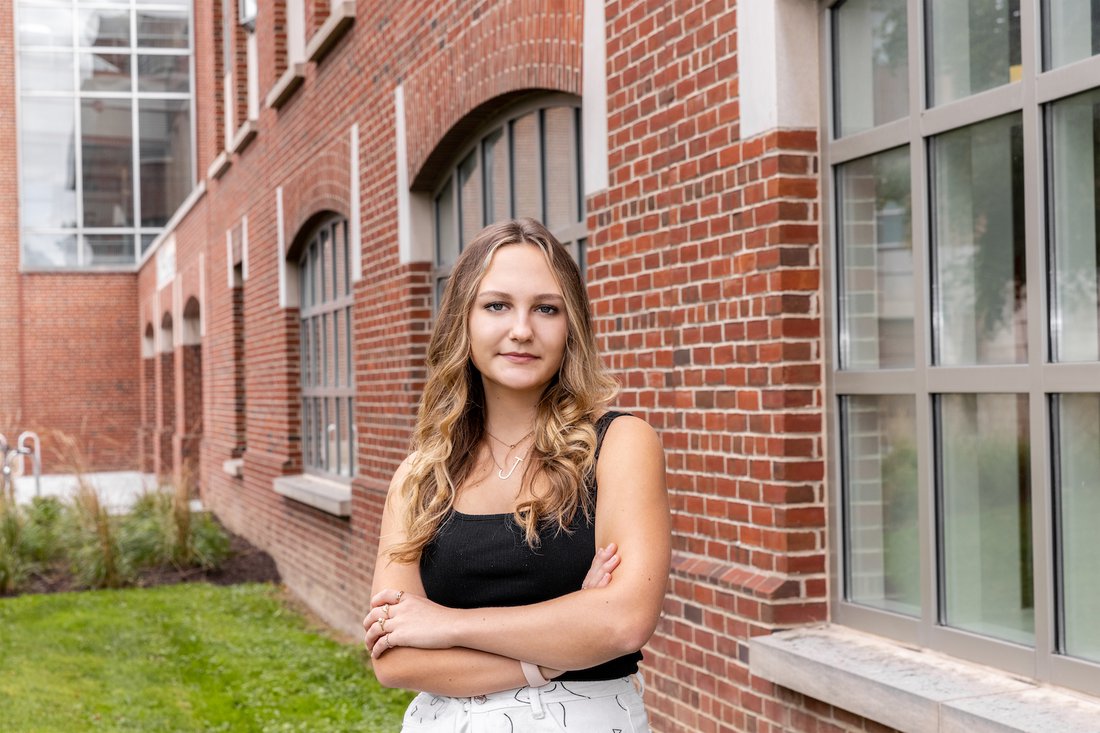
Julia Fickenscher ’22 was a teenage ballet dancer when she first became concerned about her body image. “For a while, I was entrapped by it, staring at myself in the mirror all day,” admits the Syracuse University senior, who also struggled with disordered eating habits. “I eventually got help and, in the process, learned how proper nutrition can support physical and mental health.”
The experience inspired the California native to choreograph a new life plan. Swapping her toe shoes for textbooks, she began reading up on food and nutrition. “Everyone has a relationship with food, and it’s usually complicated,” continues Fickenscher, a senior majoring in nutrition in Falk College. “Eating should be a fun, intuitive process.”
For the past year, Fickenscher has interned part time at Kelly’s Choice, a nutritional company in Skaneateles, New York, catering to individuals, employers, schools and sports teams. The job enables her to draw on her twin interests in nutrition education and media design to create content for the firm’s online platforms. “I’m especially intrigued by our workplace wellness programs,” says Fickenscher, who also is a member of the Renée Crown University Honors Program. “I love shadowing a registered dietitian and seeing how they engage with clients. I wouldn’t be doing this if I hadn’t applied to Syracuse.”
Embracing Realness
Growing up in the classic beach town of Ventura, Fickenscher seemed destined for the spotlight. She started dancing at age three and, for the next 15 years, shone at classical ballet, jazz, tap and hip-hop. “There’s a culture of thinness in dance, caused by the need for control and perfectionism,” Fickenscher explains. “As a result, many dancers—me included—deal with disordered eating that is wrapped up in body image and self-esteem issues.”
In high school, Fickenscher threw herself into journalism and student government, serving as senior class president. The award-winning honors student also was a devout foodie. The kitchen became a laboratory of sorts, enabling her to probe the art of cooking and the science of baking.
When anxiety about food followed her to Syracuse University, Fickenscher sought out help from the Barnes Center at The Arch. There, she was introduced to the concept of intuitive eating—the idea that all food is created equal. A dietitian on staff taught her to listen to her body’s internal cues and honor what she craved.

Fickenscher has since prospered at Falk, where she is training to become a registered dietitian nutritionist (RDN). After graduation, she will embark on a yearlong internship at a hospital or healthcare organization. “I’ll do all the things an RDN does—clinical practice, food service, community nutrition—before taking my credentialing exam,” says Fickenscher, who hopes to rack up 1,200 hours of work experience in 2022-23. “Afterward, I want to land a job in a private practice setting.”
In addition to interning at Kelly’s Choice, Fickenscher blogs for the University’s award-winning student-run food magazine, Baked, and manages social media for Falk’s Nutrition Education and Promotion Association, which sponsors visits by such renowned nutritionists as Nancy Clark and Cynthia Sass ’92, G’95. Fickenscher also has interned for Jamie Lopez Nutrition and Wellness in New York City while working on and off for the Original Grain and Jamba Juice franchises in Syracuse.
The Falk College ambassador is particularly proud of her 14-month stint as chair of Gamma Phi Beta’s REAL Wellness program, which supports a positive body image through physical, spiritual and mental development. “Diet culture can be a huge part of Greek life. I help people return to their authentic selves, to embrace their realness,” says Fickenscher smiling.
Frankie Sailer ’21, who mentored Fickenscher at Gamma Phi Beta, considers REAL Wellness an unmitigated success. “As chair, Jules went above and beyond, serving as a resource for more than 200 women at any time of day, under any circumstance,” Sailer remembers. “She’s knowledgeable, hardworking and, most of all, innately caring.”
Doing the Work
Although Fickenscher is some 2,700 miles from home, she considers the University a large, extended family. The mere mention of professors like Chaya Lee Charles ’04, G’14 brings a smile to her face. More than an Honors advisor, Charles has taught most of Fickenscher’s courses on nutrition and intuitive eating. “Chaya is a huge inspiration to me because she has a really cool approach to nutrition,” says Fickenscher, alluding to her professor’s research into vegetarianism and disordered eating behaviors. “Knowing what she has accomplished and that her morals align with mine make it a pleasure to work with her.”
Likewise, Maria Erdman G’09 enjoys having Fickenscher as a student. Erdman recalls Fickenscher being the only junior in her senior-level course Nutrition Counseling. “Despite her younger age, she had an air of maturity. Julia was especially good at a counseling skill called motivational interviewing, in which she exhibited empathetic and reflective listening with classmates, roommates and practice clients.” Fickenscher rounded out the experience with an experiential counseling course. “There was quite a bit of introspection and self-evaluation, but Julia did the work. She added a lot to the class.”
A recurring theme in Fickenscher’s journey is her willingness to take risks. Whether gathering information for her Honors thesis on intuitive eating, conducting a physical examination on a patient simulator or designing online curricula for Kelly’s Choice, she is a study in confidence and poise. “Julia holds strong values and applies them to her inclusive-minded philosophies on nutrition. I expect her to excel in her nutrition career,” Charles declares.
Sailer recalls the first time she met Fickenscher, who then was a freshman teaching assistant in a class full of student athletes. “I laugh every time I think about little Jules next to all those huge football players. She has a way of empathizing with others, making them the center of her world.”
Fickenscher credits the University for giving her the recipe for success: “Syracuse has helped me overcome my personal challenges, so that I can use my wisdom and knowledge to positively impact the lives of others.”
Adapted from an SU Story by Rob Enslin originally published on September 29, 2021.
Coming Back Together 2021
Starting in 1983, Coming Back Together (CBT) was the first reunion of its kind. Every three years, Black and Latino/a alumni come back to campus to celebrate their accomplishments, meet current students, and remain connected with the University.
The theme of this year’s reunion is “Celebrating 151 Years of Black and Latino/a Excellence at SU.” Over the four-day weekend, workshops, receptions, social events and cultural activities will be offered to attendees. Highlights include the CBT Celebrity Classic basketball game, a special concert featuring 90s R&B trio SWV, tailgate on the Quad and football game vs. Rutgers University, fundraising gala and awards ceremony, and a Sunday worship service featuring Grammy-winning gospel artist BeBe Winans.
Coming Back Together Awards

Syracuse University’s Office of Multicultural Advancement will be recognizing accomplished alumni during Coming Back Together (CBT) this September. One of them is Falk College Sport Management major Jasmine Jordan-Christmas ’14. She will be receiving a Young Alumni Award for Excellence in Fashion.
She will be honored for her extraordinary professional achievements by Chancellor Kent Syverud at an awards ceremony on Saturday, Sept. 11, from 7 to 9 p.m. at Goldstein Auditorium in the Schine Student Center.
Presented to African American and Latino/a alumni during CBT, the awards serve to recognize the significant civic or career achievements by the selected winners. Since 1983, the ceremony has been a signature event presented at the CBT reunion.
“The 2021 awardees represent some of the University’s best, brightest and most engaged alumni,” says Rachel Vassel, associate vice president in the Office of Multicultural Advancement. “While achieving tremendous professional success across diverse fields, these individuals are dedicated to Syracuse University and we are forever grateful to them for the many ways they support our work.”
Jordan-Christmas is a sports marketing professional for Nike’s Jordan brand, a fashion influencer and 2014 graduate of the Falk College sport management program. The daughter of basketball legend Michael Jordan, Jordan-Christmas is forging her own legacy in the sports industry and has worked closely with some of the most notable brands in sports over her 10-year career.
In her current role as field representative for sports marketing, basketball and women’s, with Nike, Jordan-Christmas manages athletes who represent the Jordan brand. She recently led an initiative to shape the future of basketball culture for women and young girls by expanding the brand’s WNBA roster to eleven active players, the largest in the brand’s history. Previously, she worked as operations coordinator for the Charlotte Hornets.
Jordan-Christmas is married to former Syracuse basketball player Rakeem Christmas and the mother of a toddler son, Rakeem “Keem” Jr. She is an Our Time Has Come scholarship donor and supports her family’s philanthropic efforts through the Rakeem Christmas Foundation and the Novant Health Michael Jordan Family Medical Clinic in Charlotte, North Carolina. She recently provided a special video message of encouragement for the Class of 2020’s virtual commencement.
Orange Circle Awards
Alumni and student groups will also be honored through the Orange Circle Awards as part of Coming Back Together 2021 celebration. Recipients are altruistic members of the SU community who have done extraordinary things in the service of others. From generous financial support to selfless volunteerism, the Orange Circle Awards recognize students, faculty, staff and alumni who possess a deep responsibility for acts that better society.
This year the Food Busters student group will be honored for their work in the Syracuse community. Food Busters was started by students within the nutrition program at Falk College.
Honors will be given during the Orange Circle Awards ceremony and reception, held from 2-4 p.m. on Sept. 9 as part of Syracuse University’s Coming Back Together celebration. The awards ceremony will occur in the Grand Hall of the Daniel & Gayle D’Aniello Building, home to the National Veterans Resource Center.
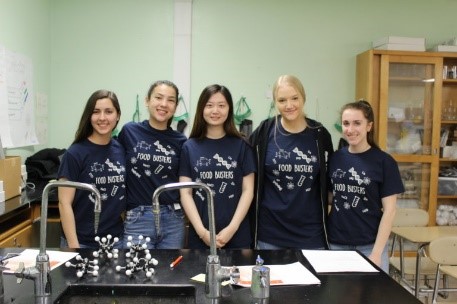 Food Busters strives to improve literacy skills and public health awareness of fellow students in the Syracuse community. The organization was created in 2014 by ShawFood Busters group photo Center nutrition volunteer coordinators Jennifer La ’14 and Katelyn Castro ’15 and Engagement Fellow Victoria Seager G’15. It sends Syracuse University volunteers from the Shaw Center into local schools to teach students to implement lesson plans designed around content they are learning in their school or college.
Food Busters strives to improve literacy skills and public health awareness of fellow students in the Syracuse community. The organization was created in 2014 by ShawFood Busters group photo Center nutrition volunteer coordinators Jennifer La ’14 and Katelyn Castro ’15 and Engagement Fellow Victoria Seager G’15. It sends Syracuse University volunteers from the Shaw Center into local schools to teach students to implement lesson plans designed around content they are learning in their school or college.
This year, Food Busters worked with Henninger High School students in hands-on, STEM-focused lessons designed to explore the relationship between food, nutrition, health and media, while also increasing these students’ comprehension in the fields of literacy, mathematics and science. Along with nutrition students from Falk College, the Henninger High School students learned to perform their own food science experiments based on the lesson plans.
Falk College CBT Event
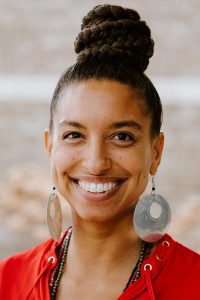
The food studies program is also hosting Leah Penniman during this year’s Coming Back Together celebration. The event, “Soup JOUMOU and a lecture TOO!,” will feature a luncheon with Soup Joumou – the Haitian liberation meal as well as a lecture by Leah.
Leah is a Black Kreyol farmer, author, mother, and food justice activist who has been tending the soil and organizing for an anti-racist food system for 25 years. She currently serves as founding co-executive director of Soul Fire Farm in Grafton, New York, a Black & Brown led project that works toward food and land justice. Her book is Farming While Black: Soul Fire Farm’s Practical Guide to Liberation on the Land.
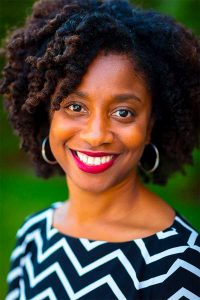
The event will be moderated by Rick Welsh, Chair of the department of Nutrition and Food Studies with panelists Marcelle Haddix, courtesy appointed professor of Food Studies, and Estelí Jiménez-Soto, assistant professor of Food Studies.
Marcelle Haddix will also be receiving an Orange Circle Award this year for her work in the Syracuse community. Haddix chairs the School of Education’s Reading and Language Arts department, and is the inaugural co-director of the Lender Center for Social Justice. Her scholarly pursuits focus on the experiences of students of color in literacy and English teaching and teacher education, as well as the importance of centering Blackness in educational practices and spaces.
For a full list of CBT events and registration information, visit the Coming Back Together 2021 website.
Falk College welcomes new faculty and staff
Syracuse University’s Falk College is pleased to welcome four new staff members who have joined Falk College in the past academic year: Stephen Bonomo, Director of Information Technology; Deborah Golia, Director of Admissions; Kailyn Jennings, Sport Management Internship Placement Coordinator; Danielle Jones, Social Work Internship Placement Coordinator; Donna Sparkes, Budget Associate, and; Emily Williams, Human Development and Family Science Internship Placement Coordinator.
In addition, Falk College is pleased to announce the appointment of six new faculty members, Lastenia-Francis, Catherine García, Esteli Jimenez, Kevin McNeill, Joey Merrin, and Fei Pei.
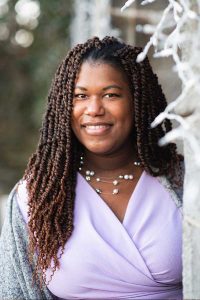
Lastenia Francis
Assistant Teaching Professor (Online), Department of Marriage and Family Therapy
Lastenia Francis (she/her/hers) joins the Department of Marriage and Family Therapy in the Falk College of Sport and Human Dynamics as an Assistant Teaching Professor (Online) in fall 2021. She will teach courses on family systems theories and practice.
Francis is a Licensed Marriage and Family Therapist and a certified trauma therapist. She has been practicing since 2014 with an attention to helping minority populations. Francis has provided clinical services in an outpatient clinic in the South Bronx working with low-income communities and communities of color, an intensive preventative program, at the Veterans Affairs as a Readjustment Counselor, and built a private practice that focuses on building strong families in communities of color. Francis previously taught at Mercy College in the Marriage and Family Therapy Program and continues to act as a mentor to developing Marriage and Family Therapists as an American Association for Marriage and Family Therapy (AAMFT) Approved Supervisor.
Francis continues to have an insatiable appetite for helping people of color maximize their potential in how they relate to themselves, their spouse, and their family and demonstrates that in her research interest. Dr. Francis was drawn to academia through her passion for training more social justice clinicians to help strengthen families especially those in minority and underserved communities. Her dissertation research focused on the reintegration experiences of Black veterans and their families.
Francis is the Founder of Meaningful E-Motion Private Practice, Assistant Editor of the American Family Therapy Academy (AFTA) blog, and a member of the AAMFT and the AFTA.
Francis Earned a Ph.D. in Marriage and Family Therapy from Northcentral University in 2021, a M.S. in Marriage and Family Therapy from Mercy College in 2015, and a B.A. in Psychology and Sociology from Stonybrook University in 2013.

Catherine García
Assistant Teaching Professor, Department of Human Development and Family Science/Aging Studies Institute
Catherine García (she/her/hers) joins the Department of Human Development and Family Science in the Falk College of Sport and Human Dynamics as an Assistant Professor in fall 2021. At Syracuse University she will teach classes in Midlife Development and Gerontology.
Prior to joining Syracuse University, García was an Assistant Professor of Sociology and core faculty member of the Minority Health Disparities Initiative (MHDI) at the University of Nebraska – Lincoln where she taught quantitative methods and served as a faculty mentor for the MHDI Summer Research Program.
García’s research focuses on Latina/o/x aging and health in the United States and Puerto Rico, applying multidisciplinary approaches to understand how the interaction of biological, environmental, and social factors influence the disease process among older Latina/o/x adults. Her research work has led to 15 peer-reviewed publications and two book chapters, including multiple manuscripts in The Gerontologist and The Journals of Gerontology, Series B: Psychological Sciences and Social Sciences.
Her research has been supported by the National Institute on Aging (NIA) of the National Institutes of Health (NIH), including an R36 Aging Research Dissertation Award to Increase Diversity from 2018-2020 and an R01 Research Supplement to Promote Diversity in Health-Related Research from 2021-2023. Her research has led to several awards, including the Emerging Scholars and Professional Organization (ESPO) Interdisciplinary Paper Award, the ESPO Poster Award, and the Minority Issues in Gerontology Poster Award from the Gerontological Society of America.
Currently, she serves as a steering committee member for the Network for Data-Intensive Research on Aging (NDIRA) at the University of Minnesota and is a committee member of the Minority Issues in Gerontology Advisory Panel (MIGAP) of the Gerontological Society of America. In addition, she will serve on the editorial board for the Journal of Health and Social Behavior beginning in January 2022.
She earned a Ph.D. in Gerontology in 2020 from the University of Southern California, an M.S. in Sociology from Florida State University in 2014, and a B.A. in Sociology with a minor in Human Complex Systems from the University of California – Los Angeles (with college and departmental honors) in 2010.
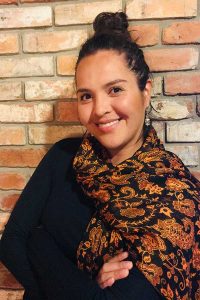
Estelí Jimenez-Soto
Assistant Professor, Department of Nutrition and Food Studies
Estelí Jimenez-Soto (she/hers) joins the Department of Nutrition and Food Studies in the David B. Falk College of Sport and Human Dynamics as a tenure-track assistant professor of food studies in fall 2021. At Syracuse University, she will teach classes in Agriculture and the Environment, including Agroecology, and Climate Change and the Food System. She joins the Syracuse Cluster Initiative in Energy and Environment.
Prior to joining Syracuse University, Jimenez-Soto was a postdoctoral scholar at the University of California Santa Cruz in the Department of Community Studies from 2020-2021, and in the Department of Environmental Studies from 2019-2020, where she taught principles of sustainable agriculture and worked on socioeconomic barriers and opportunities to adopt sustainable practices in strawberry production.
Her research uses interdisciplinary engagements, bridging the fields of agroecology and political ecology to examine environmental problems at the nexus of food, agriculture and the environment in both the U.S. and Latin American contexts. She has published in journals including Ecology and Evolution, Bioscience, and Journal of Peasant Studies and her work has been highlighted in publications such as The Economist.
Her research has been supported by UC-MEXUS, El Consejo Nacional de Ciencia y Tecnologia (CONACyT), the Organization for Tropical Studies (OTS) and P.E.O International. In 2020 she was a recipient of a Peter Ashton Award by Biotropica, a Gentry Student Award by the Association of Tropical Biology and Conservation in 2017, and a Mildred Mathias Award for best dissertation proposal by the UC-MEXUS in 2015.
She is an active member of the Ecological Society of America (ESA), the American Association of Geographers (AAG), the Latin American Studies Association (LASA), New World Agriculture and Ecology Group (NWAEG) and The Alliance for Women in Agroecology (AMA-AWA).
Jimenez-Soto earned her Ph.D. in Environmental Studies with an emphasis in Ecology and Evolutionary Biology, and a M.A. in Environmental Studies from the University of California Santa Cruz in 2018 and 2014 respectively; and an B.S. with honors in Agroecology in 2012 from Universidad Autonoma Chapingo in Mexico. She is originally from San Cristobal de las Casas, Chiapas, México.
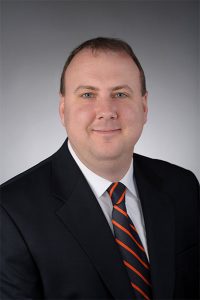
Kevin McNeill
Assistant Teaching Professor, Department of Sport Management
Kevin McNeill has been a member of the Department of Sport Management since 2019 in the David B. Falk College of Sport and Human Dynamics and will serve as assistant teaching professor beginning in the fall 2021. At Syracuse University, McNeill will teach classes in Sport Technology and Technologies in Game Day Operations.
McNeill previously served as an Internship Placement Coordinator in Sport Management and provided advising for undergraduate students in academics and career exploration. He assisted students through the senior Capstone process and taught classes in Professional Development in Sport Management.
Previously, McNeill worked at Le Moyne College as Associate Athletic Director in the Department of Athletics for 12 years as well as served Syracuse University Athletics as the Marketing Coordinator from 2004 to 2007.
While at Le Moyne, McNeill oversaw the marketing and communications for the Division II athletic program. In that role, he led programming in brand development, revenue generation, digital media, video production, corporate sponsorship, and game day management. In addition to serving on the athletic department leadership team, he co-chaired the College’s strategic plan marketing committee, participated in the College’s integrated marketing committee, and instructed in the Madden School of Business.
Serving as the Marketing Coordinator at Syracuse University Athletics, McNeill supported the department’s broad-based marketing initiatives with a focus on game day promotions, marketing campaigns, ticket sales, advertising, and graphic design.
McNeill earned a Master of Science, Sports Administration and Master of Business Administration from Ohio University in 2004 and a Bachelor of Science, Business Administration from Le Moyne College in 2002.
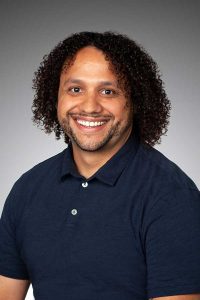
Joey Merrin
Assistant Professor, Department of Human Development and Family Science
Gabriel “Joey” Merrin (he/him/his) joins the Department of Human Development and Family Science in the Falk College of Sport and Human Dynamics in fall 2021. At Syracuse University, Merrin will teach courses in Child and Adolescent Development and Advanced Statistical Methods.
Merrin was most recently an assistant professor in Human Development and Family Sciences at Texas Tech University from 2019-2021 and taught graduate-level statistic courses where he focused on reproducible research, programmatic programming, and transparent designs using open science frameworks and guidelines. Before Texas Tech University, he held two post-doctoral fellowships, one in the Department of Psychology at the University of Victoria in British Columbia and the other in the Department of Health Management and Informatics at the University of Central Florida.
Trained as a developmental psychologist and applied methodologist, Merrin’s research seeks to clarify developmental processes through which adolescents’ experiences with their families, peers, teachers, and communities influence development of problem behaviors and experiences with identity-based harassment and victimization throughout adolescence and in the transition to young adulthood. He is particularly interested in the development of these behaviors among various minoritized and oppressed groups. His work focuses on translating and mobilizing knowledge to inform intervention and prevention efforts to improve the school experience for young people by using applied research designs, leveraging practical implications, and intentional school and community engagement.
His research has been supported by the Canadian Institutes of Health Research, National Institute of Health, and most recently, Merrin and his colleagues at Boston University launched a three-year National Institute of Justice funded study to examine bias-based harassment among adolescents to identify risk and protective factors across multiple levels of the social ecology.
Merrin was recently awarded the 2020-2021 New Faculty Award at Texas Tech University and selected into the Society of Prevention Research Early Career Prevention Scientists Training Program. Merrin currently serves on the editorial board for Prevention Science and Psychology of Violence.
Merrin earned a Ph.D. in Educational Psychology in 2017, an Ed.M. in Human Resource Development in 2011, and a B.A. in Sociology in 2009, all from the University of Illinois Urbana-Champaign.

Fei Pei
Assistant Professor, School of Social Work
Fei Pei (she/her/hers) joins the School of Social Work in the David B. Falk College of Sport and Human Dynamics as a tenure-track assistant professor of social work in fall 2021. At Syracuse University, Fei will teach Social Welfare Policy and Services.
Prior to joining Syracuse University, Fei was a Ph.D. candidate at the Ohio State University College of Social Work where she also served as a graduate instructor and research assistant, teaching research methods, lifespan development, and social welfare.
The overarching goal of Fei’s research is to promote healthy development among vulnerable children, including maltreated and immigrant youths by identifying neighborhood disparities. In particular, her research focuses on community health and child development. She published over 20 peer-reviewed papers in rigorous academic journals including Child Abuse & Neglect, Children and Youth Services Review, Family & Community Health, Journal of Community Psychology, Journal of Interpersonal Violence, and Trauma, Violence & Abuse.
Fei was trained in all aspects of grant-funded and investigator-initiated research projects, ranging from university-funded projects to federal-funded studies (e.g., NIH funded and UNICEF funded projects). Her research has been acknowledged and funded by various institutions and scholarships such as the 2021 Merriss Cornell Distinguished Researcher Award, 2019 Kempe Interdisciplinary Summer Research Institute, 2018 International Peace Scholarship, Seed Funding for 2016 Clinton Global Initiative University, and 2015 New Brunswick Chancellor’s Scholarship.
Fei actively participated in professional and community services. She was a volunteered social worker for the local agency, Asian American Community Services in Columbus, OH and the president of the College of Social Work’s Doctoral Student Organization. She also serves as an ad hoc peer reviewer for multiple academic journals.
Fei earned a Ph.D. in 2021 from The Ohio State University, College of Social Work, a MSW in 2016 from Rutgers University – New Brunswick, and a LL.B. and a B.S. (double degree) in 2014 from Shanghai University and East China Normal University.
Welcome Class of 2025!
Falk College welcomes the Class of 2025, a talented group from 37 states and 33 global countries. The Class of 2025 includes 373 first-year students, 13 transfer students, 163 new graduate students, and 156 new online graduate students. Fall 2021 Syracuse Welcome is scheduled for Aug. 26-29, 2021, with new student move-in beginning Tuesday, Aug. 24, 2021. The entire welcome week schedule for new students can be found by visiting the Syracuse Welcome website.
Falk College Syracuse Welcome Events:
Falk College Welcomes New Academic Department Chairs 2021-22
As preparations continue for the start of the 2021-22 academic year, Falk College welcomes two new academic department chairs.
- Dyane Watson, Chair, Department of Marriage and Family Therapy
Dyane Watson, Professor of Practice, began her service as Chair of the Department of Marriage and Family Therapy in July 2021. Her areas of research include the adult couple relationship, the influence of marginalization and oppression on couple and family relationships, therapeutic outcomes for children and families, mental health training and service delivery for veterans and military families, and training program evaluation for mental health professionals.
Falk College thanks Thom deLara, Professor of Practice, who served in this role since 2007. During his time as Chair of the Department of Marriage and Family Therapy, he oversaw the expansion of the department and reengineered the curriculum to specifically meet the needs of children, and of those suffering from trauma across the life cycle. In addition, under his direction the department committed itself to educating students, and mental health practitioners, about trauma-informed care as an integral part of evidenced-based clinical practice. In recent years, his curriculum priorities included the development of a nationally recognized clinical program for educating and training mental health providers to work with veterans and military families and the development and implementation of Falk College’s online Marriage and Family Therapy M.A. degree program.
- Lynn Brann, Chair, Department of Nutrition and Food Studies
Lynn Brann, Associate Professor, will begin her service as Chair of the Department of Nutrition and Food Studies in January 2022. Her research interests include the examination of dietary intake and diet quality of children and adolescents related to growth, development, and health, as well as mindful eating to improve self-regulation in children. She is involved in a research collaboration with a colleague in Public Health examining the environmental toxicants, race, and cardiovascular disease risk in children.
Falk College thanks Rick Welsh, Falk Family Endowed Professor, who has served in this role since 2014 and will conclude his service in December 2021. During his time as Chair, food studies, nutrition science and dietetics programs experienced growth and continuation of excellence in research and internships, as well as a range of study abroad experiences. Food studies curriculum development maintained the program’s focus on social, cultural, political, economic, and environmental dimensions of the global food system. Nutrition curriculum elevated nutrition’s integral connections to public health, medicine, and policy. Under Welsh’s leadership, the two programs have continued to develop and strengthen interdisciplinary research and practice and prepare students to meet emerging trends in both professional fields.
Falk College department chairs continuing their service this year are:
- Keith DeRuisseau, Chair, Department of Exercise Science
- Eunjoo Jung, Chair, Department of Human Development and Family Science
- Lutchmie Narine, Chair, Department of Public Health
- Carrie Smith, Chair, School of Social Work
- Michael Veley, Chair, Department of Sport Management
For more information about Falk College academic programs, please visit Falk.syr.edu.
Nutrition science student recognized for research impact with prestigious fellowship
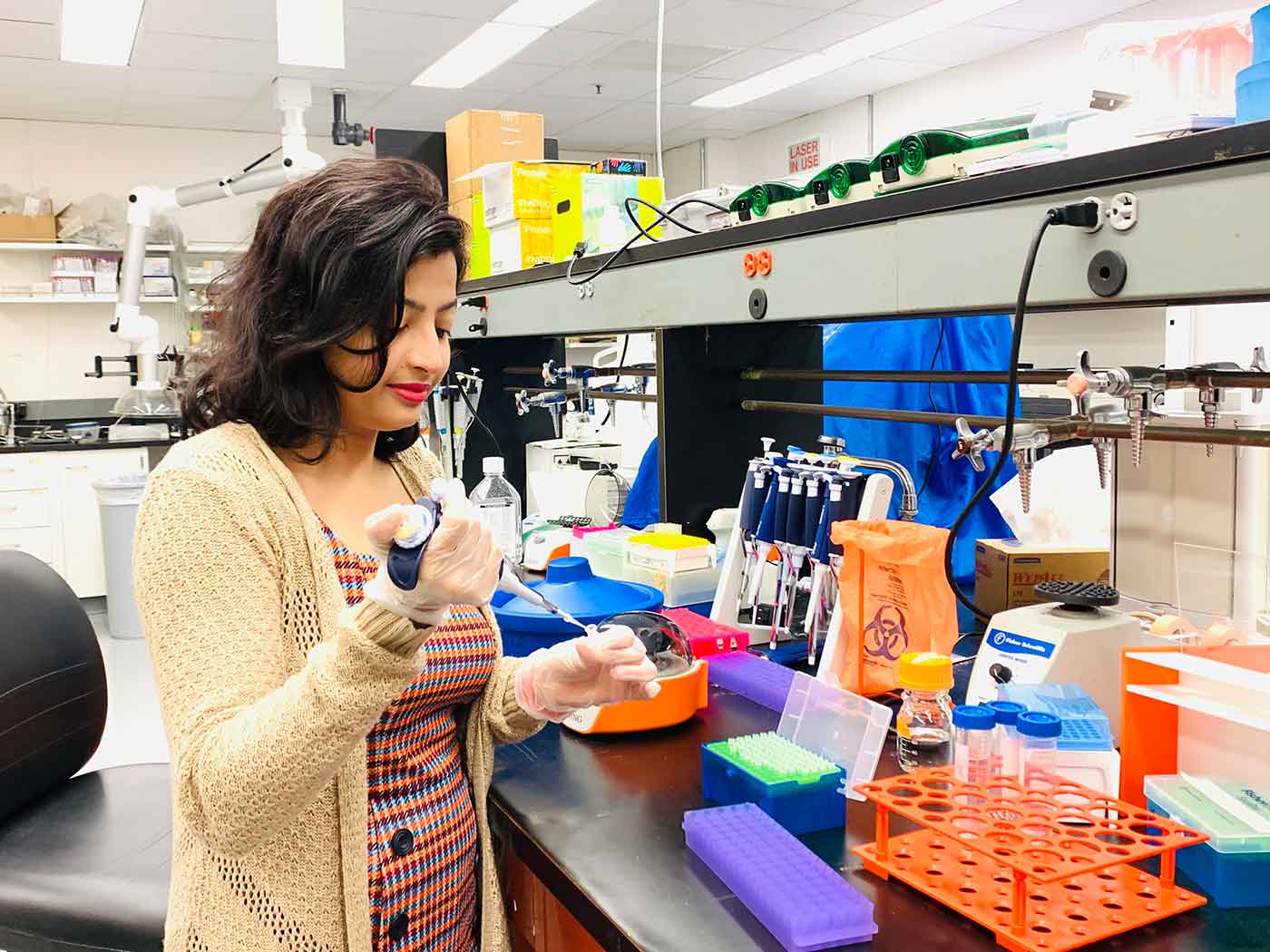
As a Falk graduate student, she investigates how certain nutrients might be used to prevent disease, specifically obesity. “Obesity is a huge health issue, with more than 42% of the U.S population being either obese or overweight. Obesity increases the risk of other complications like high blood pressure, type II diabetes, mental illness, depression, among others. Further, if the parents are suffering from obesity, the impact on their children is very high. Proper nutrients could prevent obesity,” explains Shrestha. “Currently, I am working on the topic of ‘parental obesity’ where a diet modification in parent can potentially eliminate the adverse effect of father’s or mother’s obesity on children,” she adds.
Research has been a longtime focus of Shrestha’s academic and professional career. Prior to coming to Syracuse, she performed clinical research in both Nepal and India. “I am from Nepal, the Himalayan nation in South Asia where I grew up and completed my high school,” she says. “I was always interested in studying to understand human health and diseases since my childhood.” This passion led her to pursue her undergraduate education B.Sc. in Nursing at Rajiv Gandhi University of Health Sciences in India. “During that time, I became more inclined towards the preventive approach of diseases, precisely nutrition.” Her newfound enthusiasm led her to earn her M.Sc. in Nutrition Science at Kanpur University in India. “Nutrition and diet are crucial aspects of human health and in the dynamic world, there is a need for further exploration in order to realize the goal of ‘food as medicine’ in practice.”
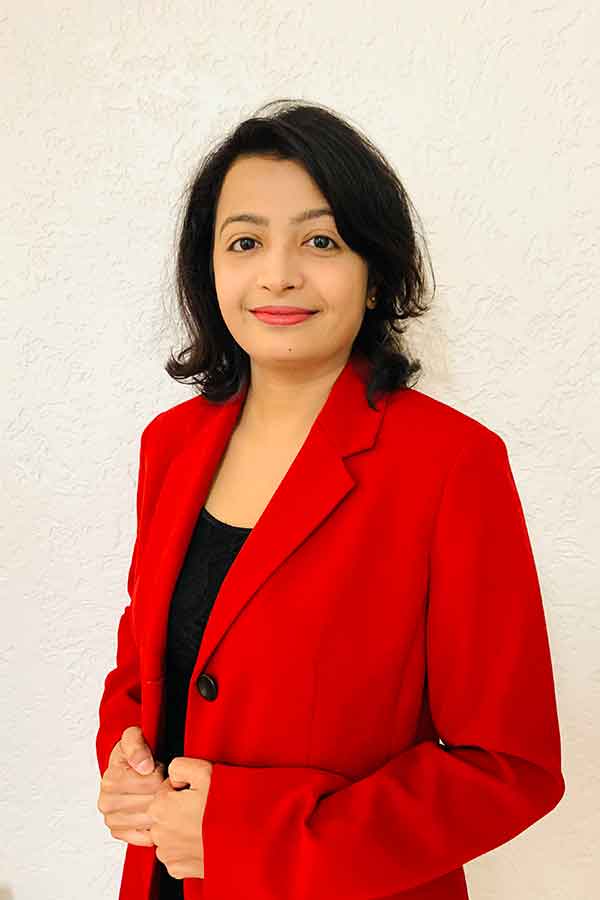 Shrestha found her way to Syracuse University’s Falk College and is working to complete her M.S. in nutrition science. “The excellent learning environment, fantastic infrastructure, and diverse student and faculty communities are something that make me very proud to be the part of Syracuse University,” she says.
Shrestha found her way to Syracuse University’s Falk College and is working to complete her M.S. in nutrition science. “The excellent learning environment, fantastic infrastructure, and diverse student and faculty communities are something that make me very proud to be the part of Syracuse University,” she says.
“The Pre-Doctoral Fellowship Award is a very competitive award with only three awards given across the U.S.,” says Latha Ramalingam, Ph.D., assistant professor in the Department of Nutrition and Food Studies, Falk College. “What makes it even more impressive is that Akriti earned it in her first year as a graduate student. She is a bright mind who will go on to do great things in the future. The faculty and I are very proud of her accomplishment.”
Shrestha says the support of her faculty members, staff, and her advisor, Professor Ramalingam, was critical in making this achievement possible. “I am also thankful to my parents for their unconditional love and blessings, and to my husband Sajag Poudel, who has always motivated and supported me in my studies as well as guided me during various stages of my career planning” she says. Poudel is a Syracuse University Ph.D. candidate in mechanical and aerospace engineering.
After she completes her M.S., Shrestha plans to pursue a Ph.D. to continue her passion for nutrition science research.
Learn more about nutrition science and dietetics programs at Falk College.
2021 Student Research Winners
The Falk College Student Research Celebration is an annual event that takes place to highlight undergraduate and graduate student research projects Students submit posters for display and are judged by a committee of faculty, staff, and peers. Participants compete for educational funds to present their posters on a larger stage, to attend a conference to gain further insights into their respective fields, or for other educational endeavors. This year’s celebration took place virtually.
Undergraduate Winners
How to Allocate the NFL Salary Cap with a Highly Paid Quarterback
Name: Zachary Koeppel
Program/Major: Sport Analytics
Faculty Research Mentor: Professor Rodney Paul
The Association that Gender Roles have with Health Seeking Behavior for Women in Kenya, Tanzania, and Uganda
Name: Gloria Nabbosa, Professor Sandra Lane, and Professor Brittany Kmush
Program/Major: Public Health
Faculty Research Mentor: Professor Brittany Kmush
EAT-26 Effectiveness in Detecting Eating Disorders in College Students
Name: Rose Noterman, Sivan Avramovich, and Professor Jessica Garay
Program/Major: Nutrition Science
Faculty Research Mentor: Professor Jessica Garay
Under the Radar: An NBA/NCAA Player Similarity Model Utilizing a Factor Analysis & Radar Plots
Name: Dominic Samangy
Program/Major: Sport Analytics
Faculty Research Mentor: Professor Justin Ehrlich
Malaria Control with Pyrethroids and Cognitive Deficits in Pre-School Aged Children in Sub-Saharan Africa: A Meta-Analysis of Cross-Sectional Surveys
Name: Megan Willkens
Program/Major: Public Health and Policy Studies
Faculty Research Mentor: Professor David Larsen
Graduate Winners
Associations Between Physical Activity, Body Mass Index and Carotid Extra-Medial Thickness in Children
Name: Danielle Arcidiacono, Wesley Lefferts, Professor Brooks Gump, and Professor Kevin Heffernan
Program/Major: Exercise Science, M.S.
Faculty Research Mentor: Professor Kevin Heffernan
Parental Autonomy Support and College Students’ Well-being
Name: Xiaoyu Fu, Woosang Wang, and Professor Eunjoo Jung
Program/Major: Human Development and Family Science, Ph.D.
Faculty Research Mentor: Professor Eunjoo Jung
Working Mothers’ Job Demands, Work-family Conflict, and Job Satisfaction in East Asia: A Comparison of China, Taiwan, and Japan with National Sample
Name: Rui Tian and Professor Kamala Ramadoss
Program/Major: Human Development and Family Science, Ph.D.
Faculty Research Mentor: Professor Kamala Ramadoss
Falk College honors faculty excellence in teaching, research, service
Three faculty members from Falk College’s Departments of Nutrition and Food Studies and Public Health and the School of Social Work were honored for excellence in teaching, research, and service with 2021 Falk College Faculty of the Year Awards. The honorees, who are nominated by their peers for outstanding teaching, scholarship, and internal and professional service contributions, were recognized by the Falk Faculty Council with awards at the end of the Spring 2021 semester.
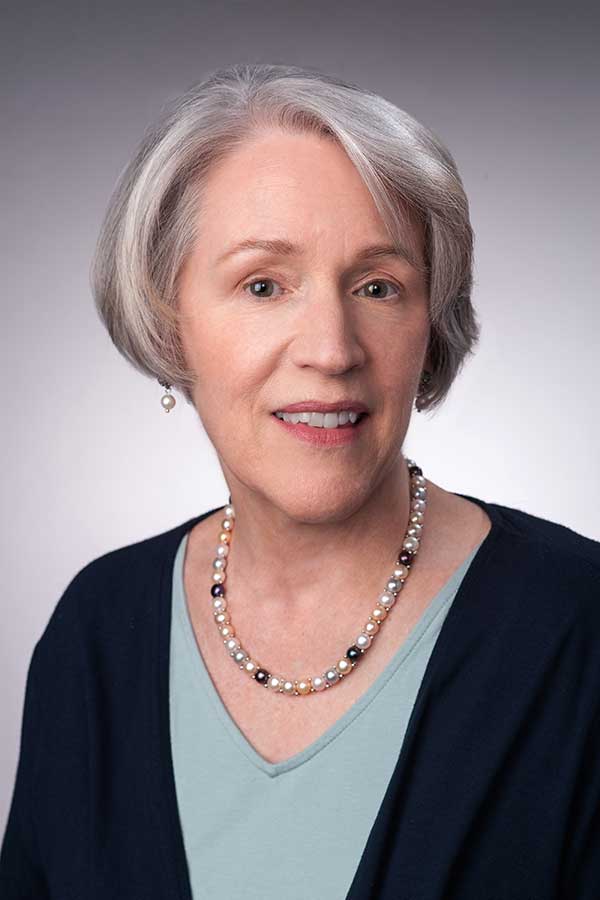
Kay Stearns Bruening
Dr. Stearns Bruening is an associate professor of Nutrition and Food Studies, and director of the Nutrition Assessment, Consultation and Education Center. She was honored with the Evan Weissman Memorial Faculty of the Year Award for Teaching Excellence. By attending numerous training sessions and mastering new technologies, she reworked courses to meet distanced and hybrid learning demands due to the pandemic. To provide formats that best met student learning needs and outcomes, she recorded 76 short lecture videos for the Medical Nutrition Therapy course she taught in the fall semester.
Professor Stearns Bruening is a leader in dietetics education and accreditation, sharing new ideas and pedagogical advances with colleagues regularly. She is an active community collaborator, including ongoing efforts with Upstate University Medical College where she co-taught a Food as Medicine Course, creatively delivering the culinary medicine cooking event and demonstration from her own home kitchen.
The inaugural Evan Weissman Memorial Award for Teaching Excellence honors the lifetime commitment of the late associate professor of food studies who engaged students in community-based work to advance social change. Professor Weissman received this same award for teaching excellence in 2016 in addition to numerous other teaching awards.

Xiafei Wang
Dr. Wang is an assistant professor in the School of Social Work. She received the Faculty of the Year Award for Excellence in Research. In 2020, she published seven peer-reviewed journal articles, submitted two book chapters and three articles, and presented two posters and one paper. One of her co-authored papers, “Measuring the predictability of life outcomes with a scientific mass collaboration,” was published in the Proceedings of the National Academy of Sciences of the United States of America. The research findings, which demonstrate her significant commitment to interdisciplinary collaboration, reveal the complexities of child development and encourage researchers to rethink computational predictions’ effectiveness. An active grant writer, Professor Wang received funding through several external grants. She is dedicated to mentoring students to embrace research, creating two undergraduate research positions through the SOURCE RA program. Thanks to her mentorship, the students secured $5,000 SOURCE grant funding.
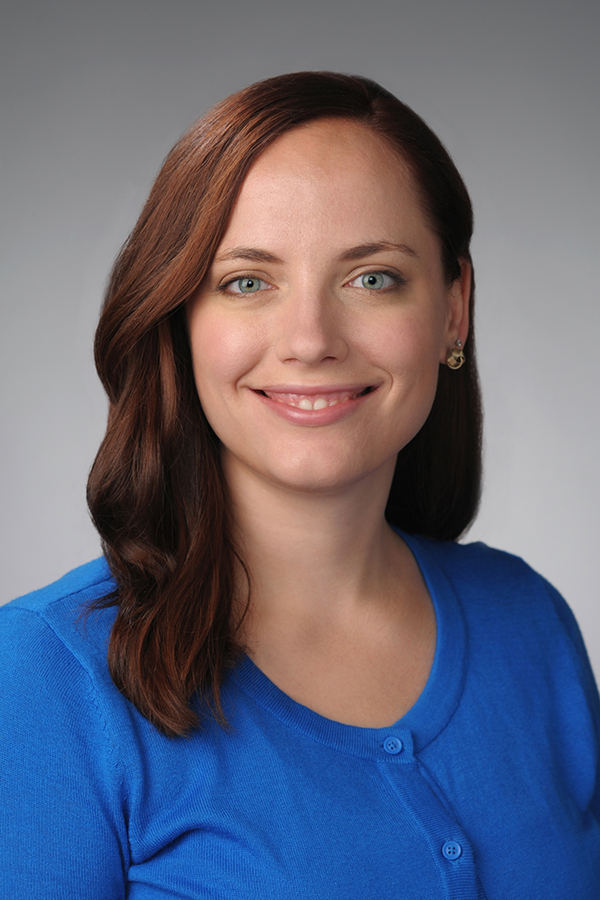
Brittany Kmush
Dr. Kmush is an assistant professor of Public Health. She received the Faculty of the Year Award for Excellence in Service. Since the start of the pandemic, she continues to apply her understanding of infectious disease epidemiology to benefit the Syracuse University pandemic response as a member of the Vice Chancellor’s Public Health Advisory Council. She coordinated the University’s mass testing efforts instrumental in the fall reopening plan, creating and overseeing the pooling lab with students and other volunteers. She oversaw the information and technology needs of the mass testing operations, working with colleagues from institutional research to ensure a data collection and test reporting system that followed students’ tests from collection, through pooling, and onto the result. An often-sought after expert for media interviews, Professor Kmush continues to be a source of insight into infectious disease dynamics, and strategies needed to undertake them.
Page 8 of 21
